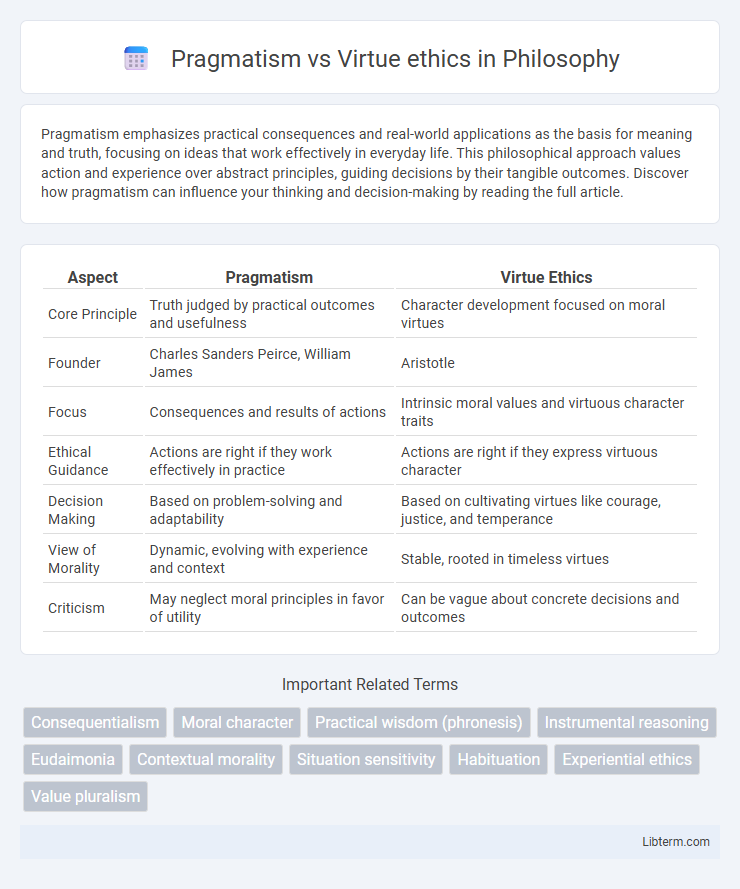Pragmatism emphasizes practical consequences and real-world applications as the basis for meaning and truth, focusing on ideas that work effectively in everyday life. This philosophical approach values action and experience over abstract principles, guiding decisions by their tangible outcomes. Discover how pragmatism can influence your thinking and decision-making by reading the full article.
Table of Comparison
| Aspect | Pragmatism | Virtue Ethics |
|---|---|---|
| Core Principle | Truth judged by practical outcomes and usefulness | Character development focused on moral virtues |
| Founder | Charles Sanders Peirce, William James | Aristotle |
| Focus | Consequences and results of actions | Intrinsic moral values and virtuous character traits |
| Ethical Guidance | Actions are right if they work effectively in practice | Actions are right if they express virtuous character |
| Decision Making | Based on problem-solving and adaptability | Based on cultivating virtues like courage, justice, and temperance |
| View of Morality | Dynamic, evolving with experience and context | Stable, rooted in timeless virtues |
| Criticism | May neglect moral principles in favor of utility | Can be vague about concrete decisions and outcomes |
Introduction to Pragmatism and Virtue Ethics
Pragmatism centers on practical consequences and real-world applications as the basis for assessing truth and ethical decisions, emphasizing flexibility and adaptability in moral reasoning. Virtue ethics, rooted in Aristotelian philosophy, prioritizes character development and the cultivation of moral virtues such as courage, temperance, and wisdom to guide ethical behavior. Both frameworks offer distinct approaches: pragmatism evaluates morality through outcomes and effectiveness, while virtue ethics focuses on the inherent qualities and intentions of the moral agent.
Historical Origins and Key Philosophers
Pragmatism originated in the late 19th century United States, with key philosophers Charles Sanders Peirce, William James, and John Dewey emphasizing practical consequences and experiential learning as foundations of truth and morality. Virtue ethics traces back to ancient Greece, notably Aristotle, who focused on character development and virtues as essential to achieving eudaimonia or human flourishing. While pragmatism centers on outcomes and adaptability, virtue ethics concentrates on cultivating moral character through habitual virtues established by classical and Renaissance thinkers.
Core Principles of Pragmatism
Pragmatism centers on the belief that truth and meaning are determined by practical consequences and real-world applications, emphasizing experience and action as the basis for knowledge. It rejects fixed moral absolutes, advocating flexible, context-dependent decision-making to solve problems effectively. This contrasts with virtue ethics, which stresses the development of moral character and virtues as the foundation for ethical behavior.
Core Tenets of Virtue Ethics
Virtue ethics centers on character development and the cultivation of moral virtues such as courage, honesty, and compassion, emphasizing the importance of habitual good character traits in ethical decision-making. Unlike pragmatism, which assesses actions based on practical outcomes and consequences, virtue ethics evaluates morality through the lens of individual character and the pursuit of eudaimonia (human flourishing). Core tenets include the belief that ethical behavior stems from internal virtues rather than external rules or results.
Decision-Making: Practical Consequences vs Moral Character
Pragmatism in decision-making emphasizes evaluating practical consequences and real-world outcomes to guide actions effectively. Virtue ethics centers on the moral character and virtues of the decision-maker, prioritizing integrity, courage, and wisdom in ethical choices. The contrast lies in pragmatism's outcome-oriented approach versus virtue ethics' focus on enduring character traits shaping ethical behavior.
Role of Context in Ethical Judgments
Pragmatism emphasizes the role of context by assessing ethical decisions based on practical consequences and situational variables, allowing flexibility in moral judgments. Virtue ethics considers context through the lens of character and moral virtues, focusing on how individuals cultivate habits that respond appropriately to specific circumstances. Both frameworks recognize the importance of context but differ in prioritizing either outcomes or the development of moral character in ethical evaluations.
Strengths and Weaknesses of Pragmatism
Pragmatism excels in its flexibility, emphasizing practical consequences and adaptability to real-world situations, which makes it highly applicable in diverse and changing contexts. However, its weakness lies in the potential for relativism, as truth and morality can shift based on outcomes, leading to inconsistent ethical standards. Pragmatism often lacks a firm foundation for universal moral principles, contrasting with virtue ethics' focus on character development and enduring moral virtues.
Strengths and Weaknesses of Virtue Ethics
Virtue ethics emphasizes character development and moral virtues, promoting personal growth and ethical consistency across situations. Its strength lies in fostering empathy, integrity, and long-term moral excellence, which adapts well to complex, real-life dilemmas. However, it faces criticism for lacking clear guidance in specific decisions and potential cultural bias in defining virtues, making it less actionable in urgent ethical conflicts compared to rule-based systems.
Practical Applications in Modern Issues
Pragmatism emphasizes practical outcomes and flexible decision-making, making it ideal for addressing complex, real-world issues like climate change and public policy by prioritizing results over rigid principles. Virtue ethics centers on developing moral character traits such as honesty and courage, guiding individuals to act ethically in situations like medical decisions and corporate governance through cultivating integrity and empathy. Both frameworks offer complementary approaches: pragmatism provides adaptive strategies for problem-solving, while virtue ethics fosters consistent moral behavior in modern ethical dilemmas.
Conclusion: Comparative Insights and Future Directions
Pragmatism emphasizes practical consequences and adaptive problem-solving, while virtue ethics centers on character development and moral virtues as a lifelong pursuit. Integrating insights from both approaches can enhance ethical decision-making by balancing situational flexibility with consistent moral principles. Future research should explore how pragmatic methods can support cultivating virtues in dynamic contexts, fostering ethical resilience in complex environments.
Pragmatism Infographic

 libterm.com
libterm.com